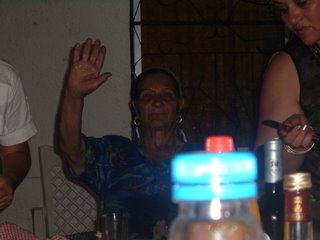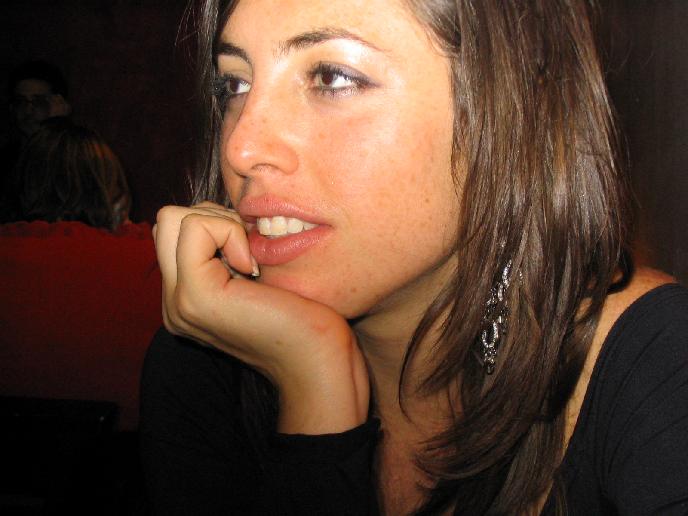In Ashdod I have been living with Effy's family. It was amongst these wonderfully dynamic people that I felt truly suffocated by Middle Eastern living. In this setting, all my familiarities disappeared. As I became immersed in an environment totally foreign to me, it was here that I have come to fully understand the culture I come from and truly appreciate the diversity of human beings that exist in all corners of the world. Western values that I have taken for granted are yet to be developed in Israel. In every social setting, the role of men, women and the family structure echo underlying values labelled as archaic and backward in Western countries. It has been somewhat of a struggle and journey to learn to leave aside the values that have shaped my conscience, and enter a home in which this understanding of life is contradicted to entirety. I have literally learnt to shut my mouth, and observe to the extent I can this 'new' to me yet 'old' way of living.
Effy's maternal and paternal grandparents came to Israel during the late 1940's after experiencing anti-Semitism and persecution in Tripoli, an Italian colony of Libya, Northern Africa. His family settled in Ashdod and continued to develop their Tripoli foundations, with marriage and offspring being maintained within their community... The result being this huge Tripoli tribe, in other words, Effy's family. The immediate members consist of him, his two brothers, and parents. Following this, on his mother, Miriam's side is the grandparents, three uncles, their wives and about 20 children. It is on his father, Yitsak's (Hebrew for Issac) side where things start to get interesting. Yitsak has nine siblings (one brother and eight sisters), extended from this we have Effy's stereo-type, 'made for mafia movies', Sephardic grandma and around fifty, yes fifty, first cousins, eight of which are also called Effy (taken from his late grandfather); and finally the remaining three pet dogs, one of which recently having eight puppies. Of those who speak English: around 3, maybe four. It is amongst these people, I came to realize how different human beings can be so different in nature, despite the biological construction of us all being identical.

'What's up' from Gangsta Nana
This 'new' culture I entered half a year ago contradicts all that seemed 'normal' to my very existence. I could envisage an imaginary knife slicing through the demographic of this family, one side being determined by a subtle form of male dominance and the other by all possible forms of female domesticity. However, do not misunderstand this situation, these Tripoli women stand far from the weak, subordinated ones that may seem to have been concocted. These women are strong and dominant in their own right. It is, however, the physical nature of their presence, the constant cooking, the repetitive cleaning and nurturing, which seems almost automatic in nature, and which unsettled my understanding of what it is to be a women in the Twenty-first century.
Table Manners
This lesson in cultural diversity took place in various daily social settings of human interaction. For example, I have always understood that eating does not simply mean 'to eat'; even more so, it has come to incorporate certain habits and behaviours. From childhood, I was taught to withhold from placing my elbows on the table, to keep my mouth closed when I eat and to try not to raise my voice at the dinner table. Put simply, certain communities in Israel seemed to miss the boat when it came to adopting a way of culinary mannerisms.
Miriam's family lives amongst each other in a 'Moshav' (this being a communal settling, similar to that of a kibbutz). Her three brothers live with their families in small bungalow-style houses, which surround the dynasty's leadership, the grandparents. The most jolting experience, so far, has been dinner time with the family. All relatives gather round grandma's table and eat mounds of meat and couscous. I do not believe my digestive system has ever quite got over the trauma of the food it has faced the last few months. One time, this consisted of eating every organ of a lamb that just had its throat slit by the local rabbi in the garden. The uncles and aunties enjoyed the delicacies of throat, brain and heart. Lunchtime is like food-lovers marathon, without a serviette or a complete cutlery set in sight.
My understanding of how humans live amongst each other was incomplete. Western people, with western values and western way of living was all I knew, yet which was what I was ignorant of until I surrounded myself with unfamiliarity. The people I came to know have a different history and foundation for living. Their behaviours may seem to shock or even insult, but this is what they know best, this is how they see fit to live in a world dominated by war and ideological terror. It works for them, so why bother changing it, even if their Western visitor may nod her head in disbelief of cultural snobbery.



No comments:
Post a Comment